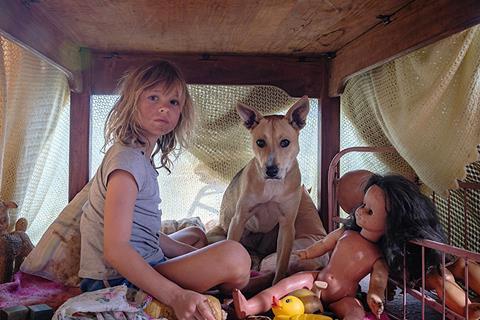Actor Embeth Davidtz makes her directorial debut with this adaption of a memoir set in racist 1980s Rhodesia

Dir: Embeth Davidtz. South Africa. 2024. 98mins
Don’t Let’s Go To The Dogs Tonight, the directorial debut from South-African actress Embeth Davidtz (The Amazing Spider-Man), is an unsettling yet unsurprising coming-of-age tale. Adapted by Davidtz from Alexandra Fuller’s same-titled memoir, the film is viewed from the perspective of eight-year-old Bobo Fuller (Lexi Venter), whose life on her prejudiced parents’ farm in Rhodesia (now Zimbabwe) is coming under threat during the 1980 national election between Robert Mugabe and Bishop Abel Muzorewa. During Bobo’s endless summer she not only comes to question whether her parents are racist, she also confronts her own bigotry.
The kind of bold swing with difficult material that does manage to earn your respect
This is a film whose intention of showing how racist ideology is generationally passed down from parent to child is noble, even if its centering of a white protagonist makes its perspective limited. Playing as a Gala Presentation at Toronto after premiering at Telluride, Don’t Let’s Go To The Dogs Tonight’s lack of stars may hinder it from wide commercial appeal. But it’s the kind of tenderly-composed passion project that shows Davidtz‘s directorial promise.
The film knowingly relies on a difficult character to like. Bobo is a total tomboy, the kind never without dirt on her face and who always has her hair in a messy tangle. She often rides around her rural town on a white motorbike with an air rifle slung across her back. Bobo has a difficult family life. Her alcoholic mother Nicola (played by Davidtz herself) is a policewoman so haunted by the prospects of Black Africans coming to murder the family — an occurrence happening across the country that’s often heard on the family’s television — that she sleeps with her rifle. Bobo’s father Tim (Rob van Vuuren), a soldier, is often away on tours of duty that involve him hunting guerilla soldiers. Her older sister Vanessa (Anina Reed) finds Bobo’s presence annoying as she deals with her own issues involving a lascivious man.
Bobo has adopted many of her parents’ backwards thoughts. Though she often hangs around her family’s Black African servants Sarah (Zikhona Balia) and Jacob (Funamni Shilubana), she doesn’t see them as fully human. “Africans don’t have last names,” she says through voiceover, in a film mostly narrated from her point of view. Despite Jacob’s protestations that Bobo is merely a white girl already learning to dehumanise Black people, Sarah still clearly cares for Bobo by trying to teach her to see other Black children as just kids, and not as her potential servants.
In this film, the land, tenderly lit by DoP Willie Nel in marigold hues, has great importance. For Sarah and Jacob, it’s where their ancestors reside. For Nicola, it’s where some of her children are buried. (Bobo often thinks back to the mysterious death of her sister Olivia through abstract memories that quickly rush through her mind.) Indeed, it often feels like Nicola cares more about the land and her horses than about her living children. She claims that she will die for this land. And whenever Tim is away, another soldier patrols her property, where poachers’ traps have been set and a glare from the surrounding hill intimates that they are being watched.
Davidtz is very good at showing the myriad indignities Black people face from their white counterparts. They are coerced into voting for white-backed candidates, used as manual labor and often patronised. Because we see these events through Bobo’s eyes, they are disturbingly portrayed in a whimsical light. When Nicola drives Bobo to a gated community to visit her grandparents, the film slows to molasses, a cheery needledrop of ’The Final Farewell’ blaring as a gleeful Bobo drives past a Black servant watering a lawn while nearby white people play tennis.
Because we’re so fixed in Bobo’s gaze, the Black characters, including Sarah, are fairly one-note. Their flatness is, of course, a deliberate commentary on Bobo’s racially biased perception — which presents Davidtz with a tricky question to answer: Why should we care about the perspective of a bigoted white girl? Through a strong performance by Venter and the film’s final grace note, where Sarah appears to be elevated in Bobo’s eyes, Davidtz attempts to land an ending that re-centers her Black characters with dignity. It’s pretty hamfisted, demonstrating how Davidtz struggles to break out of this film’s obvious narrative beats. Despite that failing, however, Don’t Let’s Go to the Dogs Tonight is the kind of bold swing with difficult material that does manage to earn your respect.
Production companies: Rose and Oaks Media
International sales: Creative Artists Agency (CAA), filmsales@caa.com
Producers: Helena Spring, Paul Buys, Embeth Davidtz
Cinematography: Willie Nel
Production design: Anneke Dempsey
Editing: Nicholas Costaras
Music: Chris Letcher
Main cast: Lexi Venter, Embeth Davidtz, Zikhona Bali, Fumani Shilubana, Rob Van Vuuren, Anina Reed
























